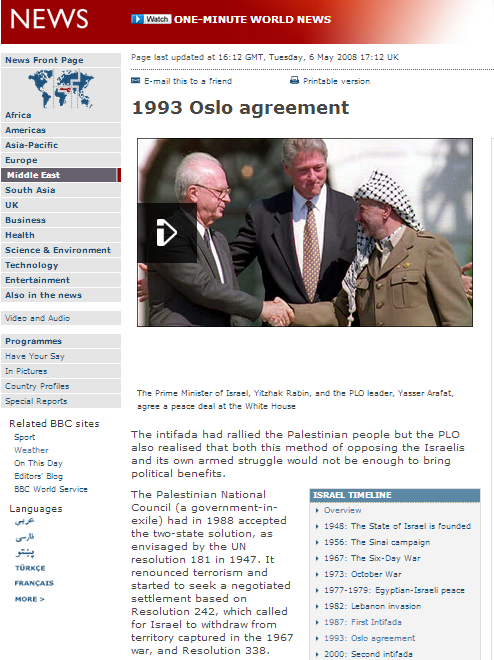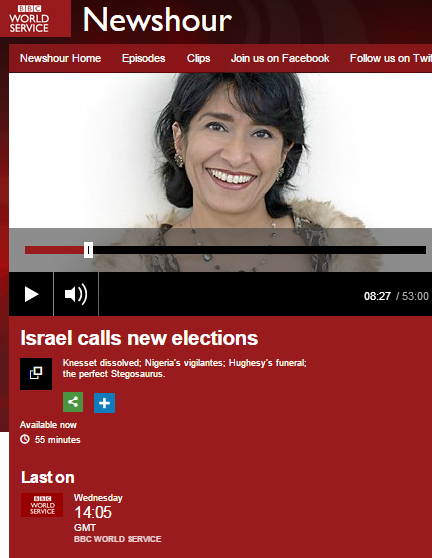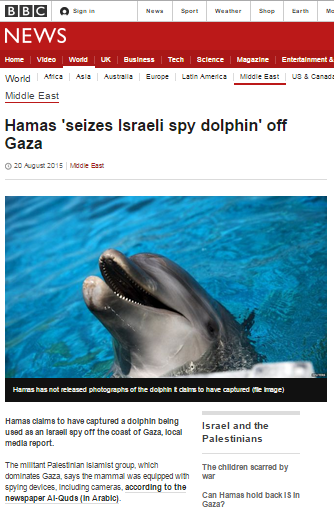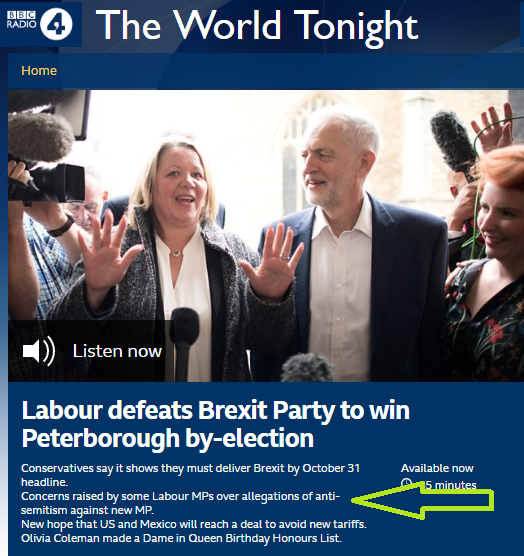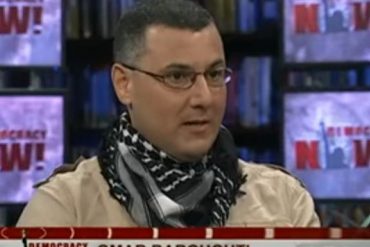On the occasion of the twentieth anniversary of the signing of the Declaration of Principles of the Oslo Accords, a BBC audience member conducting an internet search for information on that subject would, among other items, come across a backgrounder dating from May 2008 titled “1993 Oslo agreement” which forms part of the BBC’s “History of Israel: Key Events“.
The article states:
“The Palestinian National Council (a government-in-exile) had in 1988 accepted the two-state solution, as envisaged by the UN resolution 181 in 1947. It renounced terrorism and started to seek a negotiated settlement based on Resolution 242, which called for Israel to withdraw from territory captured in the 1967 war, and Resolution 338.”
Rather than a “government in exile”, the Palestinian National Council was at the time in fact the legislative body of the Palestine Liberation Organisation (PLO – designated as a terrorist organization by the United States and Israel until 1991) when, on November 15th 1988 in Algiers, it unilaterally declared Palestinian independence. Upon the reading of the declaration, PLO chair Yasser Arafat assumed the title ‘President of Palestine’.
The BBC article makes no effort to clarify to readers the fact that neither Arafat nor the PLO held any democratically elected mandate to represent the Palestinian people: its status as their representative had in fact been parachuted upon them in 1974 by the same Arab League which had created the organization a decade previously (and three years prior to the Six Day War) in order to achieve the “liberation of Palestine through armed struggle”.
What of the BBC’s claim that the PNC “accepted the two-state solution” in that 1988 document? Well, the document itself carefully avoids any specific definition of territory.
“Whereas the Palestinian people reaffirms most definitively its inalienable rights in the land of its patrimony: Now by virtue of natural, historical and legal rights, and the sacrifices of successive generations who gave of themselves in defense of the freedom and independence of their homeland; In pursuance of Resolutions adopted by Arab Summit Conferences and relying on the authority bestowed by international legitimacy as embodied in the Resolutions of the United Nations Organisation since 1947; And in exercise by the Palestinian Arab people of its rights to self-determination, political independence and sovereignty over its territory, The Palestine National Council, in the name of God, and in the name of the Palestinian Arab people, hereby proclaims the establishment of the State of Palestine on our Palestinian territory with its capital Jerusalem (Al-Quds Ash-Sharif).” [emphasis added]
In the official political communique published as an appendix to the declaration, the PNC stated:
“This session culminated in the announcement of the rise of the Palestinian state in our Palestinian land, the natural climax of a daring and tenacious popular struggle that started more than seventy years ago and was baptised in the immense sacrifices offered by our people in our homeland, along its borders, and in the camps and other sites of our diaspora.”
Far from accepting a two-state solution – which of course depends upon recognition of Israel – the communique goes on to state:
“The crimes of the occupation and its savage, inhuman practices have exposed the Zionist lie about the democracy of the Zionist entity that has managed to deceive the world for forty years [i.e. since 1948 – ed.], revealing Israel in its true light – a fascist, racist, colonialist state built on the usurpation of the Palestinian land and the annihilation of the Palestinian people, a state that threatens and undertakes attacks and expansion into neighbouring Arab lands.” [emphasis added]
At the time of the PNC declaration in 1988, the Palestinian National Charter (or covenant) still rejected Israel’s right to exist and called explicitly for its destruction.
“Article 2:
Palestine, with the boundaries it had during the British Mandate, is an indivisible territorial unit.
Article 15:
The liberation of Palestine, from an Arab viewpoint, is a national (qawmi) duty and it attempts to repel the Zionist and imperialist aggression against the Arab homeland, and aims at the elimination of Zionism in Palestine. Absolute responsibility for this falls upon the Arab nation – peoples and governments – with the Arab people of Palestine in the vanguard. Accordingly, the Arab nation must mobilize all its military, human, moral, and spiritual capabilities to participate actively with the Palestinian people in the liberation of Palestine. It must, particularly in the phase of the armed Palestinian revolution, offer and furnish the Palestinian people with all possible help, and material and human support, and make available to them the means and opportunities that will enable them to continue to carry out their leading role in the armed revolution, until they liberate their homeland.
Article 19:
The partition of Palestine in 1947 and the establishment of the state of Israel are entirely illegal, regardless of the passage of time, because they were contrary to the will of the Palestinian people and to their natural right in their homeland, and inconsistent with the principles embodied in the Charter of the United Nations; particularly the right to self-determination.
Article 20:
The Balfour Declaration, the Mandate for Palestine, and everything that has been based upon them, are deemed null and void. Claims of historical or religious ties of Jews with Palestine are incompatible with the facts of history and the true conception of what constitutes statehood. Judaism, being a religion, is not an independent nationality. Nor do Jews constitute a single nation with an identity of its own; they are citizens of the states to which they belong.”
Only in September 1993 did Arafat undertake to have the articles in the Palestinian National Charter which deny Israel’s right to exist brought to the PNC for removal, although it took over five more years before any action was taken, even according to the most optimistic accounts. The BBC’s claim that the PNC accepted a two-state solution in 1988 is therefore highly tendentious.
The BBC article fails to point out to readers that its cited “UN resolution 181 in 1947” – which was never more than a recommendation – has no legal standing, having been rejected by the Arab states.
And what of the claim made in this article that the Palestinian National Council “renounced terrorism” in 1988? The declaration itself – as one would expect from the legislative arm of a terrorist organization – extols terrorism in no uncertain terms:
“And so Palestinian resistance was clarified and raised into the forefront of Arab and world awareness, as the struggle of the Palestinian Arab people achieved unique prominence among the world’s liberation movements in the modern era. The massive national uprising, the intifada, now intensifying in cumulative scope and power on occupied Palestinian territories, as well as the unflinching resistance of the refugee camps outside the homeland, have elevated awareness of the Palestinian truth and right into still higher realms of comprehension and actuality. Now at least the curtain has been dropped around a whole epoch of prevarication and negation. The intifada has set siege to the mind of official Israel, which has for too long relied exclusively upon myth and terror to deny Palestinian existence altogether. Because of the intifada and its revolutionary irreversible impulse, the history of Palestine has therefore arrived at a decisive juncture.”
The accompanying political communique is even more explicit: [all emphasis added]
“In the light of this, and toward the reinforcement of the steadfastness and blessed intifada of our people, and in accordance with the will of our masses in and outside of our homeland, and in fidelity to those of our people that have been martyred, wounded, or taken captive, the Palestine National Council resolves: First: On The Escalation and Continuity of the Intifada
A. To provide all the means and capabilities needed to escalate our people’s intifada in various ways and on various levels to guarantee its continuation and intensification.
B. To support the popular institutions and organisations in the occupied Palestinian territories.
C. To bolster and develop the popular committees and other specialised popular and trade union bodies, including the attack groups and the popular army, with a view to expanding their role and increasing their effectiveness.”
And indeed, the five years which separated the PNC’s 1988 declaration from the 1993 Oslo Accords and the end of the first Intifada resulted in the deaths of some 173 Israelis at the hands of Palestinian terrorists.
As is well known – and was known when the BBC published this article in 2008 – the signing of the Oslo Accords brought a new wave of terror which was followed by even worse terrorism during the second Intifada – orchestrated and financed by none other than Arafat in his simultaneously held roles as President of the Palestinian National Authority and Chair of the PLO.
Even taking into account the fact that some of the post 1988 terrorist attacks against Israelis were perpetrated by groups which do not come under the PNC umbrella (the article completely fails to mention that the PNC/PLO does not, for instance, include Hamas), the BBC’s promotion of the notion that the PNC “renounced terrorism” in 1988 is completely inaccurate given that many of the individual groups making up the PLO were directly involved in terror – not least the Al Aqsa Martyrs Brigade which self-identifies as the military wing of Fatah – the largest faction in the PLO and the one formerly headed by the same Yasser Arafat who headed the PLO at the time of the PNC declaration in 1988.
Over five years after its publication, it is high time that this misleading backgrounder underwent serious review and correction.

